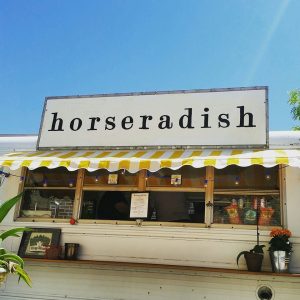| Name Horseradish Food Truck & Alley Cafe
Business Type Dining + Beer/Wine Garden Location Princeton, Wisconsin Population 1,192 Owner/Manager Matt Trotter Website www.facebook.com/ Phone (920) 980-2572
Products Sold & Niche Developed Founder and owner, Matt Trotter, serves creative sandwiches and salads in an old school bus next to his popular retail shop, Teak & Soxy, in central Wisconsin. The business – operated by himself, his mom, brother and partner – offers local ingredients with craft beer and wines for a unique street side experience. How it got started The family has always been big into food and cooking. The winter after Teak & Soxy’s 3rd season, they got the food truck bug. After some additional |
research, the owners found a dilapidated school bus, which they had to lug from Northern Wisconsin to its current location outside the store. Not before long, they were applying for licensing and conducting research within the industry. Green Lake had a community kitchen available, which made the risk and initial investment easier to bear for the owners. Who it serves Horseradish Food Truck has a large following of loyal locals who dine weekly. In addition, the food truck receives numerous spikes in business through the summer tourist months. Tourists often come from Chicago, Milwaukee and Madison. Building Improvements The body of the bus received little improvements. The main improvements were a simple striped awning, wooden bar and the “horseradish” sign. The owners invested in the furnishings to resemble a casual “European-style” sidewalk cafe. In 2016, they added a lattice-walled tent to house their “beer garden”, which was required by the city to serve alcohol outside and has turned out to be a favorite hang out. Funding The owners funded the food truck privately and saved a considerable amount by using the community kitchen, versus having to outfit the truck with a full on kitchen. This way, they only needed minimal refrigeration and equipment to be able to hold and finish off the food. Reviewed by Emily Lutz, UW-Extension CCED |





